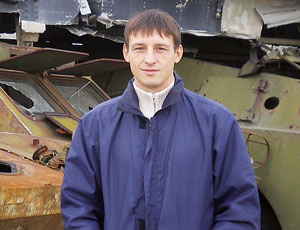Borys Kulishenko is part of a generation to have grown up near Chernobyl and found work there since the accident 22 years ago. Now 28, Kulishenko was a small boy when his father was �forced� by the Soviet authorities to move from his job at Russia�s Kursk nuclear plant to work on Chernobyl's water-supply system a year after the accident, he says.

“All the friends I went to school with, all of them went to Chernobyl,” says Kulishenko. His wife works for the new shelter project’s management team in Slavutich, the plant's new service town.
Sponsored by Chernobyl's operator, Kulishenko went to the Crimea 11 years ago to study radiochemical engineering. He now supervises radioactive solids disposal from the plant. He seems settled in his Chernobyl career, though he has recently explored other options. “In Russia the pay is more,” he says. “But the condition is you must have Russian citizenship.”
Working around nuclear waste holds no horrors for Kulishenko. “You need to understand what you’re doing and where you step,” he says. But would he take his two-year old daughter to the plant? “No,” he says. “Better be safe”


Post a comment to this article
Report Abusive Comment